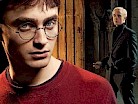Is it possible Harry Potter is fostering anti-Christian bigotry in our youth?
Our kids hear every day in public schools about the perils of "intolerance" and "homophobia." They are cautioned frequently to "separate church and state," because not to do so would result in vague, unspecified horrors. And merely raising an eyebrow at evolutionary theory can unleash pent-up fury over Christian beliefs.
So, kids know who the establishment thinks are supposed to be the "bad guys" in America: conservative Christians. But then along comes the most popular book series of all time to further undermine Christian theology by glamorizing occult practices – and it doesn't end there. Harry Potter has a not-so-subtle political message as well.
Kids read a story and figure out right off who the heroes are, and who the villains. In the Potter tales, there are several types of villains: the "dark magic" Lord Voldemort and his ilk; the mean teen wizard group at the Hogwart's school; and then there's a group we might call the fools. In Harry's world, they're called "Muggles."
These residents of the conventional "non-magic" world are portrayed as clueless at best, sometimes harmless, but mostly obstacles to progress. Enlightened witches and wizards have to work around their ignorance in the government and in everyday life. Only occasionally do the wizards pull back the curtain to reveal to Muggles what's really going on, and it's usually more than these one-dimensional creatures can handle. Denial is one response; dying of fright is another.
At times, though, Muggles blossom into full-blown bigots and bullies. Harry's relatives are depicted in this way. His Uncle Vernon Dursley is a "big, beefy man with hardly any neck" (page1, "Sorcerer's Stone") who "didn't approve of imagination" (page 5). Because he is so ferociously "anti-magic," Uncle Vernon's worst fear is that someone will find out Harry's a wizard.
In fact, Uncle Vernon's attitude toward Harry is classic bigotry:
"Now, you listen here, boy," he snarled. "I accept there's something strange about you, probably nothing a good beating wouldn't have cured. …" (page 56, "Sorcerer's Stone")
The message that screams from these pages for children to absorb is that these despicable people who object to "magic" are worthy of the worst scorn. And that's mostly what they receive throughout the Potter books.
Our children quickly figure out that Muggles equate to traditional conservatives. And who are the most fervently "anti-magic" in real-world America? Christians. If kids don't get this right off, the mainstream media's frequent, negative caricatures of Christians will connect the dots for them. Might this be one more clue to explain the rise in virulent anti-Christian sentiment in recent years?
In the Potter books, it's OK to hold such people in thorough contempt and sometimes openly mock them. Harry's school nemesis, wizard Draco Malfoy, shows undisguised bias against Muggles or those with mixed Muggle and wizard "blood," and his nasty attitude is politically incorrect by the school's standards. But Malfoy just expresses what the others secretly think.
Author Rowling reveals hero Harry's hateful thoughts toward his relatives, who have been carefully drawn as disgusting people. His apparently justifiable resentment comprises many passages:
"Asleep was the way Harry liked the Dursleys best; it wasn't as though they were any help to him awake. … They were Muggles who hated and despised magic in any form, which meant Harry was about as welcome in their house as dry rot." (page 19, "Goblet of Fire")
Harry's cousin Dudley is described as a fat underachieving bully with "small piggy eyes" (page 51, "Half-Blood Prince"). Harry, an orphan, is at first assigned a broom closet under the stairs when he arrives at his uncle's home. He gets little to eat, and his home situation only improves due to manipulation, sometimes supernatural, on the part of his wizard protectors.
The power of wizardry brings Muggles to their knees, in fact. When professor Dumbledore comes to the Dursley home to fetch Harry for another year of school, the family becomes a comic tool of sorcery, which they are powerless to stop ("Half-Blood Prince," chapter 3). Occult power is, you see, supposedly superior to anything the conventional world can offer – another great lesson for our kids.
Scads of self-described Christian families purchase Harry Potter books for their kids, allow them to attend the movies, and even indulge their forays into Potter chat rooms and fan clubs. Many think nothing of giving the parental stamp of approval to stories about a school teaching sorcery to children and teens and other elements that are outright tutorials in the occult. It's "fantasy," they reason, and no worse than lots of fiction out there.
What they don't get is more and more teens are seriously into "wicca" and paganism, actually experimenting with rituals of a supernatural nature. Many teens say their interest was initially sparked by reading Harry Potter books.
Is a little entertainment worth imbedding some very unfaithful ideas in the heads of children? Sorcery is named specifically in Scripture as a violation of God's law (Deuteronomy 18:10-12; Galatians 5:20 and elsewhere), and it's not a joke. Besides, Harry does not think like a Christian in many other ways. He nurses and feeds grudges against his relatives and his rivals at school, and revenge is portrayed as justifiable.
The author also does not maintain a light-hearted tone, but her clever and comic elements blend into nightmarish scenes of slithering snakes, kids trapped underwater, blood sacrifice, severed limbs and even the death of a schoolmate. This "bait-and switch" storytelling should raise red flags for discerning parents.
So next time you hear your kids dish out scorn for Christians and /or Christian beliefs, maybe it's time to take an inventory of their favorite books and movies.
What will another Potter tale add to the mix? Rowling could decide to have Harry repent of his open rebellion against God through sorcery. Maybe she will cease dishonoring traditional "non-magic" beliefs. And, pigs could also start flying.
Until this happens, Christian families need to protect their kids from Harry Potter's clever seduction.
----------
Originally published July 18, 2007 on World Net Daily



